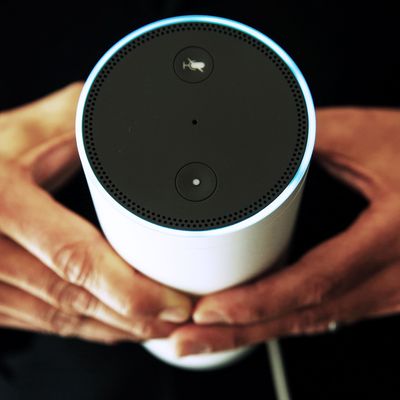
If you have an Alexa device like the Amazon Echo in your home, chances are you’ve said or done something embarrassing — if not damning — after activating it. You might feel comfortable with Amazon holding onto a transcript of that recording for a limited time, but what about developers you don’t know? Per the Information (subscription required), Amazon is considering significantly expanding how much data it shares with Alexa app developers. Specifically, it may begin providing transcripts of what exactly people are asking Alexa while using their Skill.
The move comes as Amazon attempts to turn Alexa’s Skills (essentially the smart speaker’s voice-controlled apps) into a more attractive platform for developers, particularly as more players like Apple and Microsoft enter the smart-speaker marketplace. As of now, developers have no real way to monetize their apps — while you can sell your own services (say, order an Uber or a pizza from Domino’s), you can’t sell a Skill by itself for Alexa, though the company did start paying developers who have created games that induce people to interact with Alexa for longer periods.
Right now, the Echo family (and the many, many other products now using the Alexa API) compete only with the Google Home. Amazon easily outclasses Google on how many apps are available — Amazon has over 15,000, while an estimate from VoiceBot says Google has 378.
But, according to developers speaking to the Information, Google is making a pitch: We’ll give you the full transcript of what’s said to Google Home after your action is triggered. Amazon doesn’t currently offer the same, except to a small group of developers on a “white list.” To be clear: this doesn’t mean Google (or, eventually) Amazon would be passing along everything you said after activating your Echo or Google Home. Rather, developers would get anonymized data about only the voice queries made using their own app. Think of it as the difference between an app developer somehow being able to see everything you do on your smartphone (which would raise all sorts of serious privacy concerns) versus being able to get metrics on what users tend to do in their particular app.
The benefits for developers would be easy to imagine. Right now, developers can see usage stats for their Alexa apps, but not what people are actually saying. Imagine you’re developing an app to help remind users of upcoming appointments. You have programmed in responses to “What’s on my calendar for today?” or “What’s happening today?” but not to “What’s on my docket?” Users who use the wrong words will just experience an app that doesn’t respond when they want it to.
“Right now, anyone who launches a Skill, even if they’ve earnestly invested the time and done their homework, is, at best, launching with 70 percent of what they need to know,” said Ahmed Bouzid, speaking to the Information. Bouzid, who now works to develop Skills for Alexa, formerly headed up the product team for Alexa at Amazon.
For users, however, it may not feel quite so helpful. It may feel kinda uncomfortable. Both Alexa and Google Home are always passively listening in your home, waiting to hear the activation phrase to wake it up. These passive recordings are only stored on your local device, and only for a short time — the only data that gets passed along to Amazon or Google is when you say, “Okay, Google” or “Alexa” (or whatever your activation phrase may be). Still, I know the Echo we keep in our kitchen has activated a few times when somehow our conversation has produced syllables close enough to “Alexa” to wake it up.
We’re still very much in the early days of allowing smart speakers into our homes. I’ve spoken with plenty of people who remain uneasy with the idea of having an always-on microphone and have stayed away from the Echo or Google Home. The knowledge that Google is already passing along data to anyone who registers as a developer, and Amazon may soon move to do the same in the near future, isn’t likely to assuage their concerns.
We’ve reached out to both Google and Amazon for clarification on what data is passed along, and how (and if) they anonymize it, and will update if either company responds.
This piece has been updated to clarify exactly what is provided to Google Home developers.





























